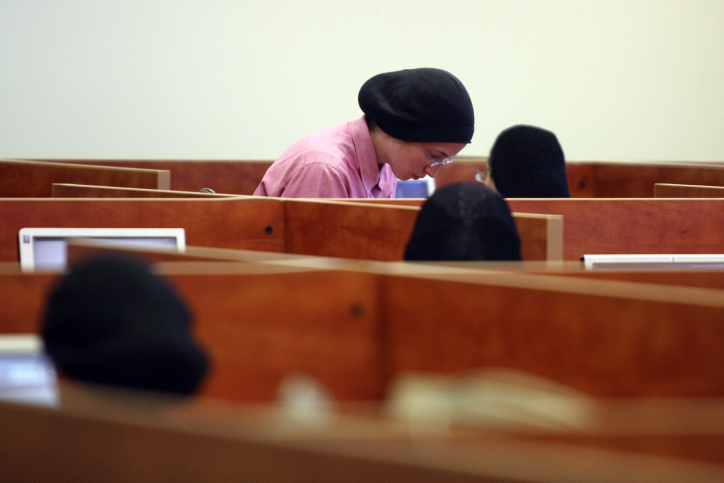
Hundreds of female students and seminary graduates who studied computer programming seek to make a living from the profession every year. But since the market is flooded with job seekers, it is very difficult to find work - especially since most of them have no experience, and are rejected outright.
Five Stars: A Passover vacation like never before in the ultra-Orthodox sector
Recently, a phenomenon has developed: unemployed female students offer themselves to computer companies, agreeing to work for free - so that this period will count as a year of experience for them. This way, it will be easier for them to find paid work later.
The phenomenon has caused a great controversy in the Haredi sector: veteran employees at computer companies have banded together and attacked the interns. They claim that employers are finding good employees for free, and are starting to deduct the salaries of veteran employees - while saying: 'Be thankful we didn't fire you, there are many interns who agree to work for free, and some of them are really talented, no less than you.'
The veteran workers claim that the phenomenon is harmful to all Haredi women, because their value decreases, and that if this phenomenon spreads further, a situation will arise in which the value of wages will drop to a minimum.
On the other hand, the interns who have just graduated from the seminary claim: This is our right. If in the future we find a good job thanks to the move, because the volunteer period will count as a year of probation for us - why don't we do it that way? Another argument: We are not harming you at all, because the Sages said that no one touches another's will as if it were a full grain of wheat, and each one receives in any case what God has decreed for her - and you have nothing to worry about.
The fascinating polemic reached the table of the rabbi, Rabbi Yitzhak Zilberstein, who sat on the bench, and after an extensive discussion of the issue, he expanded on it in his explanatory response - which was published in the weekly newsletter 'Divrei Hemed', which is published every week from his Torah.
Initially, Rabbi Silberstein divided the discussion into two parts: the first - how the damage is indirect. That is, it is not about a specific workplace, but rather a general question - whether it is appropriate for interns to work for free, when because of this the sector of ultra-Orthodox workers may be indirectly harmed.
The adjudicator ruled on this question, because since the interns do not want to get rich at the expense of the veterans, but only want to make a living, and at the moment it seems to them that this is the best way for them - it is impossible to prevent them from volunteering anyway.
In the second part of the answer, the posak discusses the case where interns offer themselves to work for free at a particular workplace, and because of this the employer reduces the salary of the veteran employees. Is it permissible to volunteer here too, when the damage is direct, or is it not permissible since they deprive the veteran employees of their livelihood?
His conclusion is, according to what the Gra wrote in the commentary, that the entire prohibition is only to completely stop the other person's life and livelihood, but if he only reduces his livelihood, he can claim: 'You will receive what was decreed for you from heaven, and I will receive what was decreed for me from heaven.'
Therefore, in the event that the veteran workers do not claim that the move completely 'stops' their livelihood, but only 'reduces' it, they are seemingly wrong in their claim, because each receives what is decreed for her from heaven, and no one touches the preparedness of another as if it were full of ink.
At the end of his remarks, Rabbi Zilberstein advises: If there is still a problem here, and they want to bring order to this profession, there is advice, and it is to establish a kind of 'Association of Haredi Women Programmers' under the supervision of a prominent rabbi. All programmers will be registered in the association, and they can amend regulations for those in the profession, as explained in the Shulchan Aruch, which authorizes those with a craft to make regulations regarding their craft, and that anyone who violates the condition will be punished in this way and that way, and if there is a wise man there, one should act according to the wise man's advice.
Rabbi Zilberstein added: The order of things should be - gather everyone, and let the majority agree. It is possible that everyone who is programming will register for the representation, and then they will elect a senior representative who will take care of all the rights of the workers - and if the majority of the representation agrees, it is considered as if the majority of the workers agreed, and this is binding on all of them. The posek also points to several 'latest' who have already written this idea regarding craftsmen.
Ultimately, Rabbi Zilberstein concludes and summarizes the halachic ruling: "As long as there is no fixed regulation that the market should not be broken by working for free, it is impossible to prohibit an intern from working for free. And even if they arrive at a certain workplace, and the employer there reduces their salary because of this, there is no argument in this, because the prohibition against reducing the salary of workers is only if they stop living, but if they only reduce their salary, there is no prohibition. And if we want to fix the market, we must unite together, under rabbinical supervision, and make regulations for the benefit of programmers."